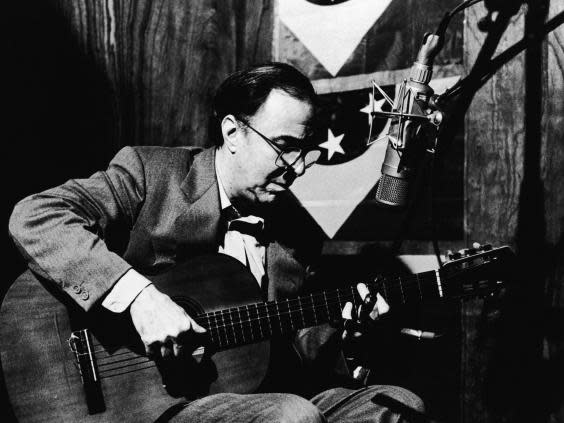Joao Gilberto: Bossa nova master who crystallised the genre’s breezy, intimate sound
Brazilian guitarist and singer Joao Gilberto helped to define the subtle, swaying and quietly sensuous style of music known as bossa nova, which became a worldwide craze in the 1960s.
Gilberto, who has died aged 88, began his musical career in the 1940s, but it wasn’t until the mid-1950s that he developed the distinctive understated vocals and syncopated rhythms that would become known as bossa nova (Loosely translated, “new wave” or “new trend”).
Once he joined forces with composer and performer Antonio Carlos Jobim then the wave began to crest. His 1958 recording of Jobim’s “Chega de Saudade”, sung in an intimate style without vibrato, became Gilberto’s signature tune and launched the bossa nova movement. Singing in Portuguese, he conveyed a mood of both longing and regret in the lyrics by Vinicius de Moraes, roughly translated, in part, as: “But if she comes back, if she comes back/ What a beautiful thing, what a crazy thing/ For there are less fish swimming in the sea/ Than the kisses I’ll give you.”
Derived from Brazil’s traditional samba music and the melodic cool jazz of the 1950s, bossa nova gained further exposure in a 1959 film, Black Orpheus, with a soundtrack by Jobim and Luiz Bonfa. American jazz musicians soon adopted the new style and in 1962, guitarist Charlie Byrd and saxophonist Stan Getz recorded “Jazz Samba” at Washington’s All Souls Unitarian Church. The album spent more than a year on the US pop charts, reaching No 1.
In 1963, Gilberto and Getz recorded an album, Getz/Gilberto, that was not released until a year later. The first voice heard on the album’s most famous song, Jobim’s “The Girl From Ipanema”, is that of Gilberto, singing De Moraes’s Portuguese lyrics while gently strumming his guitar.
He sets a tone of breezy, sun-dappled nonchalance that is picked up in an English-language verse sung by Gilberto’s wife at the time, Astrud Gilberto, and later by Getz’s soaring tenor saxophone. The song became an international hit. The Getz/Gilberto album sold more than one million copies and received several Grammys, including Album of the Year.
A follow-up album, Getz/Gilberto II, was released in 1966, but Gilberto was never comfortable with the fame that came his way. He remained aloof, comfortable only when delving deep into his music in a private, almost reverential way. He sometimes stopped his performances if audience members were speaking or cancelled engagements if a club or concert hall was too noisy.
Gilberto “carries reserve to an unusual extreme for a performer”, The New York Times wrote in 1968, but he “has gauged his art so skilfully that the listener is caught up in the mood and the effect becomes almost hypnotic”.
Joao Gilberto do Prado Pereira de Oliveira was in 1931 in Juazeiro, in the northeastern Brazilian state of Bahia. His father was a prosperous businessman.

Gilberto had few interests beyond music and was captivated from an early age by what he heard on the radio – from the American music of Duke Ellington, Tommy Dorsey and Frank Sinatra to traditional Brazilian music.
He began singing in groups in Bahia’s capital of Salvador and later in Rio de Janeiro, but he was often late or absent and was ultimately fired. For several years, he stayed with friends and relatives, not holding a job and smoking huge amounts of marijuana.
After his family briefly sent him to a psychiatric hospital, he stopped using drugs and eventually began performing at a club in the city of Porto Alegre. He practiced long hours in his sister’s bathroom, learning to sing softly without vibrato while developing a complex, fingerpicking style of guitar playing.
By 1956, he had returned to Rio de Janeiro, where he teamed up with Jobim. Several other composers and performers took part in the development of bossa nova, but it didn’t receive its fullest expression until Gilberto’s version of “Chega de Saudade”.
His marriage to Astrud Gilberto (nee Weinert) ended in divorce. In 1965, he married Heloisa Maria Buarque de Hollanda, a singer known as Miucha. They later separated. Survivors include a son from his first marriage; a daughter, singer Bebel Gilberto, from his second marriage; and a daughter from another relationship.
In 1997, Gilberto sued the EMI record label because he thought a reissue of some of his early music had been botched. In later years, he had financial problems, but his place in Brazilian culture was secure.
Gilberto lived in the United States and Mexico before returning to Brazil in the early 1980s. He performed in the United States in the 1990s and early 2000s before giving his final performance in 2008.
Joao Gilberto, musician, born 10 June 1931, died 6 July 2019
© The Washington Post

 Yahoo News
Yahoo News 
